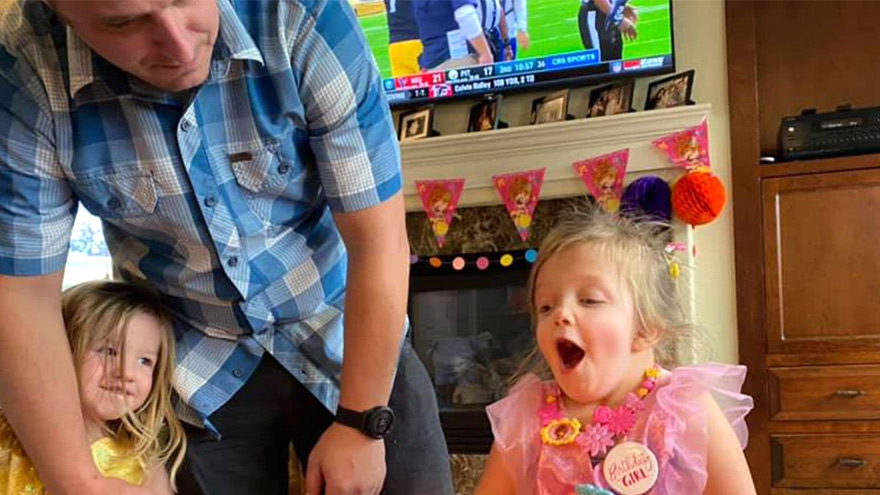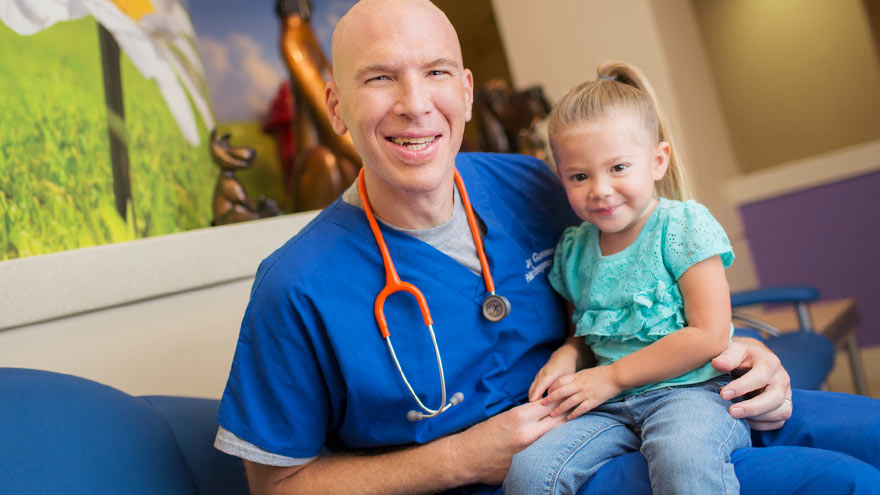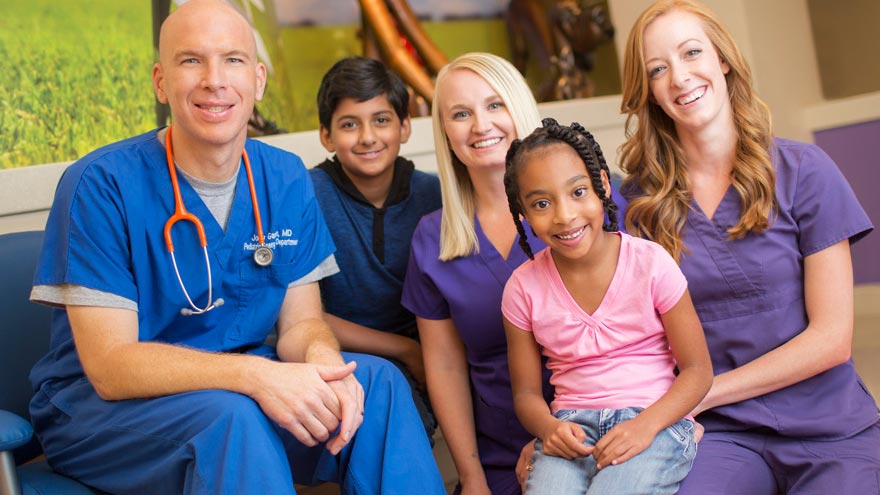Buscar
Results for 'imaging'
Clear-
A Fighting Chance at 24 Weeks Sloans Story
Most babies weigh just one pound and are roughly the size of an eggplant when they reach 24 weeks of development inside the womb. It is a crucial stage when internal organs begin functioning, and the babies' respiratory and central nervous systems are still developing. So, in November 2021 when Kallie Johnson experienced a premature rupture of amniotic fluid around this point in her pregnancy, her care team in Winnemucca decided to transport her via Care Flight to Renown Regional Medical Center. The team at Renown Children’s Hospital immediately began discussing the risks of delivering at 24 weeks with the Johnson family. Moving Forward with Hope Knowing the stakes, Kallie remembers never feeling rushed to decide about delivering her baby preterm. “I felt educated and supported by my care team at Renown throughout our entire stay, starting with the education they provided about what it meant to deliver my baby early,” Kallie said. “The team really helped me make the best decision for myself and my family.” Together, Renown employees and the Johnson family moved forward with a healthy set of nerves and a powerful feeling of hope. Weighing in at one pound 11 ounces, Sloan entered the world on Nov. 19, 2021, via emergency Cesarean section. Her birth was classified as a micro preemie because she was born before week 26 of pregnancy and so small that she fit inside the palm of her father Sterling’s hand. A full-term pregnancy is classified as reaching 39 weeks. A Fighting Chance Called a fighter by many Renown Children’s Hospital care team members, Sloan spent over five months in the neonatal intensive care unit (NICU). She was placed on a ventilator, fed through a feeding tube and monitored 24/7, overcoming daily challenges with the Renown team and her family. As a result of being born prematurely, Sloan developed a grade one brain bleed and a congenital heart defect called patent ductus arteriosus, a persistent opening between two major blood vessels, causing too much blood to flow to the lungs and heart. To meet the oxygen needs of her tiny lungs, Sloan was intubated and developed a severe oral aversion and high-arched palate as a result. The effects would lead to difficult developmental and physical challenges that she still conquers today. Yet, with the help of her care team – including physical, occupational and speech therapists, dieticians and doctors – Sloan continues to make progress every day.
-
Neurodiagnóstico
The Neurodiagnostics team at Renown Health offers a wide range of comprehensive imaging, electrical impulse detection, and other neurodiagnostic procedures to help doctors quickly and accurately diagnose neurological conditions, allowing them to create an effective treatment plan. Using neurodiagnostics, our neurologists can diagnose a variety of dysfunctions in the nervous system, such as: Autonomic disorders Brain tumors Epilepsy Head trauma Movement disorders, such as Parkinson’s disease Multiple sclerosis Neuromuscular diseases Peripheral nerve injuries Sleep and breathing disorders Spinal cord injuries Stroke Vascular disease
-
Experto en escoliosis pediátrica de Reno da nuevas esperanzas a una niña
For Michael J. Elliott, MD, a pediatric orthopedic surgeon specializing in scoliosis, it’s just another day helping patients. But to local five-year-old Makenna Christensen, her substantial spine correction is life-changing. Though her journey to body confidence was months in the making, her smiles are a reminder that a thorough, thoughtful treatment plan can yield amazing results. A Surprising Start Words don’t adequately describe the feelings you have when you unexpectedly learn your child has a birth defect. For Nicole and Nick Christensen it was a shocking surprise. During Nicole’s sonogram appointment something unusual was seen. After an amniocentesis, their baby girl was diagnosed with Noonan syndrome, which can affect a child’s height and bones. To prepare, the couple read all they could on the subject. Fortunately their daughter Makenna, was born full term and healthy. Shortly after birth, Makenna had some feeding issues and returned to the hospital. Although they resolved and she had no major complications, both parents felt unsure about their newborn’s future. With the help of Nevada Early Intervention Services , Makenna’s development was monitored until she was three years old. “Her posture has been an issue her whole life,” says Nicole. Nick also noticed when Makenna started walking her range of motion was poor. It was especially noticeable when she got dressed and raised her arms to put on clothing. Nicole observed Makenna was falling a lot in preschool. She asked Makenna’s pediatrician about physical therapy to support her coordination and muscle tone. Although physical therapy was helping Makenna, her therapist suggested Nicole seek the opinion of Dr. Michael Elliott, a pediatric specialist in orthopedics at Renown Children’s Hospital. Scoliosis Casting - A Successful Treatment Approach Dr. Elliott diagnosed Makenna with scoliosis, an abnormal curvature of the spine. While this condition is most common during a teenage growth spurt, it can also happen in early childhood. Affecting about four million people in the United States, it is estimated 20 percent of all spinal deformities in the U.S. are people living with scoliosis. Makenna’s spinal curve was significant – over 30 degrees. Through years of experience Dr. Elliott opted to put Makenna in a spinal cast, instead of multiple surgeries. “My approach is to postpone surgery as long as possible - it is tough for the patient and families,” he says. “Often excellent results can be achieved through non-invasive treatments such as, casting and bracing.” Nicole appreciated Dr. Elliott’s reassurance through the treatment plan. “It was obvious through the X-rays that there was a significant issue,” she shares. “He guided us through the timing and process and how correcting it sooner would help keep her future growth on track.” For seven months Makenna wore a cast that looked like a tank top, bracing her spine while allowing movement. Now she wears a hard plastic brace, specially fitted to her body. “Kids tolerate casting well,” explains Dr. Elliott. “It is a 45-minute procedure. The patient sleeps while their spine is put into traction as the cast dries.” She will continue to wear larger braces as she grows, eventually only wearing them at night. A Straight Path into the Future Dr. Elliott admits, “Not every cast is a cure. Two thirds of a child’s spinal growth happens by the age of five. Getting past the five-year mark means fewer surgeries. It’s wonderful to see Makenna’s body image improved.” Nicole agrees, “The way Makenna holds herself is completely different. She’s more confident on her feet and more balanced.” She can now play with her sister Aria, 4, and brother Lexi, 8 months, without the fear of falling. Nick is in awe of the improvements she has made, “Seeing her thrive more has been wonderful.” The Christensen’s are hopeful about the future. “Makenna is doing really good. She’s wearing her hard brace full time and her growth is consistent,” expresses Nicole. “She’s even starting swim lessons this week.” With mask wearing at every doctor visit during the COVID-19 pandemic, Makenna and Dr. Elliott look forward to seeing each other’s smiles in the future. Makenna’s story highlights the over 18 different specialty options for children locally at Renown Children’s Hospital.
Read More About Reno Pediatric Scoliosis Expert Gives New Hope to Young Girl
-
Parkinson's Disease Know The Important Symptoms
Parkinson’s disease – you may have heard of it because Neil Diamond and Ozzy Osbourne were recently diagnosed with it. Or perhaps you know Michael J. Fox is a strong advocate and funds research through his foundation. Neurologist Jonathan Spivack, MD, discusses this disease, while physiatrist Stephanie Jones, DO, explains how physical therapy can help as a supplemental treatment. According to the Parkinson’s Foundation about ten million people worldwide currently have this disease. What is Parkinson’s Disease? “Parkinson’s disease is a neurodegenerative disease that progresses slowly and definitely, though at variable rates,” explains Dr. Spivack. “Symptoms go beyond the classic motor changes. It results from a loss of specific dopamine-producing brain cells. Specifically, this loss is likely due to a mix of genetic and environmental factors,” he adds. Dopamine allows communication between particular nerve cells responsible for movement. If you have Parkinson’s dopamine levels gradually drop, causing a loss of motor skills. Generally, most patients with the disease are over age 65. Early Signs and Symptoms Diagnosing Parkinson’s can be difficult as some of the symptoms happen during the natural aging process. The Parkinson’s Foundation identifies the following 10 early signs of PD: Tremors or shaking of your hand, fingers or chin Small handwriting Loss of smell Sudden movements during sleep Stiffness when walking or moving Constipation Softer or lower voice volume Mad facial expression Feeling dizzy or faint Hunching or stooping posture A single sign may not point to the disease, but if you (or a loved one) has multiple signs, talk to your healthcare provider.
Read More About Parkinson's Disease Know The Important Symptoms
-
Mantener su cerebro sano, sin importar su edad
It’s true there is no cure for dementia, yet studies suggest your life choices today can reduce brain decline in the future. How important is diet to brain health? Food is the foundation of your body. Fats, carbs and protein provide the energy for your cells and metabolism. So the quality and amount of food you eat directly affects your brain. Specifically, researchers are paying special attention to the link a high sugar diet and/ or an unhealthy fat diet may have on your brain. Your brain on sugar According to the Alzheimer’s Association, when too much sugar is in the bloodstream for long periods of time, it can damage the brain cells. Many people with diabetes may develop brain abnormalities, and these changes may increase chances of dementia — research is still being done to understand this connection. Many U.S. adults have prediabetes with blood sugar higher than normal. Insulin resistance often leads to diabetes. Insulin resistance has been linked to metabolic syndrome, which is a precursor for cardiovascular and cerebrovascular disease (heart attack, stroke). Some signs of metabolic syndrome include: Large waist size (40 inches or more for men, 35 inches and up for women) Low HDL (good) cholesterol level Higher than normal blood pressure — 130/85 and above Current research suggests too much sugar in the blood causes inflammation, which can damage brain cells. High carbohydrate foods, such as sweetened beverages, chips, white rice, white potatoes, bagels, cereals and desserts, have been shown to raise blood sugar. Although anyone can get diabetes, Hispanic Americans and African Americans are at greater risk.
Read More About Keeping Your Brain Healthy, No Matter Your Age
-
Llevando la atención pediátrica cerca de casa
As our community grows, so does the need for specialized care. Thanks to a generous gift, there’s a healthier future for families in the region as a $7.5 million gift to the Renown Health Foundation is helping keep care close to home. Being in the hospital is often a stressful experience, especially for a child and their caregivers. If you add the need to travel out-of-state for care into the mix, unnecessary anxiety and financial burdens can be placed on a family that is already worried about a sick child. With our quickly growing community and close to 100,000 children under the age of 18 in Washoe County alone, the need for local specialty care is needed. The William N. Pennington Foundation recognized this need and donated $7.5 million to the Renown Health Foundation – the largest gift the health system has received – to keep care close to home and establish the William N. Pennington Fund for Advanced Pediatric Care. Thanks to this gift, Renown Children’s Hospital has hired more than 15 pediatric specialists who provide care for children in our community. Below, we introduce you to three key specialized pediatricians in northern Nevada: Joseph A. Gassen, M.D. “Having pediatric specialists in the community is invaluable,” says Joseph A. Gassen, M.D., pediatric emergency medicine. “It allows families and patients to stay in Reno and not have to travel far distances to get quality care.” Gassen, the only doctor specializing in pediatric emergency medicine in the region, moved to Reno to provide care in the emergency room at Renown Children’s Hospital. “The hospital is dedicated to improving the care of children in northern Nevada, and I wanted to be a part of this amazing vision," Dr. Gassen says. I would not have been able to relocate to Reno without the support from the hospital and the William N. Pennington gift.” Working with children and their families are what Dr. Gassen finds most rewarding. "I get to provide care for a child, which in turn makes the parent feel better,” he says. “Essentially, I get to treat the whole family, even though I only directly care for the kids.” Colin Nguyen, M.D. Also among the first new specialists is Pediatric Neurologist Colin Nguyen, M.D., who has done extensive work with epilepsy and epilepsy surgery. “In any growing and expanding community, we need the multitude of social, financial, political and well-being services to sustain that growth and progress,” Dr. Nguyen says. “The ability to offer more breadth of medical services to our local population allows families to spend more time together and fulfill work obligations, without the need to travel long distances to obtain that specialized care.” Dr. Nguyen says he enjoys caring for children because they are honest in their emotions and reactions, as well as simple in their intentions. “It is the overall joy and unique sadness that comes in working with children, which drives many of us to continue our work -- I am no exception.” Jacob Zucker, M.D. The third pediatric specialist providing care thanks to the Pennington gift has close ties to northern Nevada. Jacob Zucker, M.D., pediatric hematologist-oncologist, was born and raised in Reno and attended medical school at the University of Nevada, Reno School of Medicine before moving to the Midwest for his residency and fellowship. Dr. Zucker feels fortunate to have been offered the opportunity to return home and give back to the community that has given so much to him. “I can say with absolute resolve that northern Nevada is an exceptional community to practice medicine in. The care offered here at home is top rate and the providers that live and practice here truly understand the purpose of community.” The addition of these three specialists and the future specialists that will be coming to our area will impact thousands of children and their families. “With a growing population, the vision of leadership at Renown, and with the generosity of the William N. Pennington Foundation, northern Nevada is in position for the first time to make local pediatric subspecialty care a reality and to keep our families at home in their community,” Dr. Zucker says.
-
Concussion Risks and Prevention
It’s important to be aware of the risk of a concussion, which can have serious health implications. Susan Park, MD, discusses the effects of concussions and how they can be prevented. According to Susan Park, MD, a Renown Medical Group doctor who specializes in sports and family medicine, concussions are a serious issue — especially among children whose developing brains “are more susceptible to brain injury and long-term effects from concussions.” All parents, coaches and athletes, she points out, should be aware of the risks of concussions and take precautions to avoid them. What is a concussion and how does it occur? Dr. Park describes a concussion as a traumatic brain injury resulting from direct or indirect impact to the head or body, during which the brain shakes back and forth in the skull. This may cause some bruising of the brain. In severe cases, traumatic head injuries can cause bleeding, which if not treated quickly, can be fatal. What are the health implications of a concussion? Symptoms of drowsiness and confusion can be a sign of a concussion after a head injury. Some short-term effects may include headaches, dizziness and difficulty concentrating. Long-term concerns can further include mood disorders, sleep disturbance and problems with cognitive function-concentration, which may affect school performance. What sports carry the highest risk of suffering a concussion? Dr. Park notes participation in any impact sport can result in a head injury. But among school-age kids, she treats more concussions from football and soccer than any other sport. However, during the winter months, skiing and snowboarding injuries can be a common cause of concussions Any blow to your head, neck or upper body can result in a concussion with symptoms including, but not limited to, feeling dazed or confused, dizziness, nausea/vomiting or a headache. Initial treatment of concussions varies depending on severity. Rest, avoiding vigorous activity and a reduced school workload help young athletes recover after a concussion. Dr. Park notes that sometimes further imaging and an ER visit will be required. Otherwise, rest from activities is the main treatment, along with not returning to sports activities until further clearance from a healthcare provider.
-
Children's ER, Urgent Care or Wait it Out? Here's Your Guide
We’ve all been there: Your child gets sick right after urgent care closes — or worse, in the middle of the night. So do you wait it out, or do you load up and head to the Children’s ER? Pediatric Emergency Physician Joey Gassen, MD, with Northern Nevada Emergency Physicians, has insight. As parents, we often wish we had all the answers. And while a short-and-sweet comprehensive parenting guide is elusive, we can help if your questions involve whether to go to the children’s ER or wait it out. Here, a pediatric emergency physician explains when you should take your child to the Children’s ER at Renown Children’s Hospital, and what makes a children’s ER different. How do you know when it’s time to take your child to the ER? Having a sick or injured child is stressful. If you have a true emergency, you should go straight to the ER or call 911. When to go to the ER: Allergic reactions Asthma or severe shortness of breath Fever (infants less than two months old) Choking or poisoning Coughing up or vomiting blood Fainting, confusion or seizures Fractures or broken bones Head injuries Severe bleeding If you determine your child’s condition isn’t life-threatening but needs to be taken care of right away, urgent care is the best choice. Those conditions include: Cold and flu Coughs and sore throat Fevers Vomiting, diarrhea, stomach pain Cuts and severe scrapes Minor injuries and burns What is different about Renown Children’s ER compared to the adult ER? The difference starts when you first bring your child in. We have a lobby dedicated to our community’s smallest patients. The 24/7 lobby incorporates a child-friendly atmosphere with vibrant colors to help decrease anxiety that can accompany emergency situations. Our children’s ER also has equipment sized just for kids of any age. We offer a distraction machine, as well as games and movies, to help children cope with what can be a traumatic experience, like getting an IV. In addition, we have Child Life Specialists available to provide the emotional support to both children and their families. Why is it important to have an emergency room and lobby open 24/7 dedicated to children? Children aren’t just little people. They have special needs that require specialized care. Our children’s ER is staffed with skilled physicians and pediatric nurses certified in advanced pediatric emergency care to give your child the highest level of support. Renown Children’s Hospital From newborns to teens, Renown Children’s Hospital offers many different services and treatments designed specifically to take care of our community’s children. We provide a range of specialized services — from a dedicated Children’s ER and Pediatric ICU to a children’s imaging center and child’s asthma program. Explore Children’s Services
Read More About Children's ER, Urgent Care or Wait it Out? Here's Your Guide
-
Women and Stroke Surprising Signs to Know
Stroke is unfortunately common, with 1 in 5 American women experiencing it each year. When it comes to a stroke the phrase “time is brain” speaks to the urgency of getting rapid care. In fact, a woman may lose nearly 2 million neurons per minute of oxygen loss to the brain. The Renown Health Comprehensive Stroke Center experts share the importance of timely treatment and how stroke symptoms can differ in women. Women and Stroke – Surprising Symptoms Each year stroke affects more women than men. Even more concerning, women are less likely to recover from a stroke. The following non-traditional, less common, warning signs can be common in women: Hiccups with chest pain Sudden disorientation, drowsiness, confusion or a general altered mental status Nausea or vomiting A sudden headache that feels like the ‘worst headache of your life’ Unusual chest pain (especially with hiccups) Body numbness or weakness, such as an arm or leg suddenly ‘falling asleep’ Fainting or loss of consciousness Stroke Diagnosis The first step is neuroimaging by CT scan. This allows for rapid identification of any bleed, and also assists in determining candidacy for the early clot busting medication. MRI brain imaging is much higher resolution, and can better determine the core stroke size, assisting in prognosis and recovery. Since strokes have several different origins, an inpatient workup is essential to determine the underlying cause. Whether the stroke is secondary to plaque in the large vessels, clots being thrown in the setting of atrial fibrillation (an abnormal heart rhythm), or small vessel disease from years of uncontrolled vascular risk factors (high blood pressure, smoking, high cholesterol, diabetes), determining the cause is essential to implementing a management plan to reduce risk for further strokes. Quick Treatment for Stroke is Key Early recognition of stroke symptoms and seeking prompt attention is paramount. There are interventions that can be instituted to minimize the stroke and increase likelihood of recovery, but only if a patient presents to the hospital early. A clot busting medication, called tPA, can be given to patients with stroke if given within 4-5 hours from time of onset. Renown Regional Health Center is designated as a Comprehensive Stroke Center, the highest level of stroke certification available. To earn the designation of comprehensive stroke center, a hospital has to meet stringent requirements, including biannual on-site evaluations. This includes care for ischemic stroke patients (lack of blood flow), hemorrhagic stroke patients (bleeds), and determining the underlying cause to guide secondary stroke management prevention. Stroke Symptoms Remember “B.E.F.A.S.T.” to recognize the symptoms of a stroke below: B – Balance Being off balance or dizzy, is common. E – Eyes An eyesight change such as blurring or double vision may occur. F – Face droop One side of the face, or lip, droops A – Arm weakness Does one arm drift down? S – Speech Talking may slur or sound strange. T – Time Time to call 911. Call an ambulance immediately if you or anyone else, experiences any of these symptoms.
-
Questions to Ask Your Neurologist at Your First Appointment
When it comes to your neurological health, seeking the expertise of a specialist is crucial. The Renown Institute for Neurosciences provides comprehensive care for complex diseases affecting brain, spinal cord and peripheral nerves. Let us help guide you through the appointment process to ensure a productive and informative first appointment. What to Expect at Your First Appointment at the Renown Institute for Neurosciences Duration and Purpose: Your first appointment will last approximately one hour. This time allows the doctor to ask specific questions, do a thorough neurological exam and discuss your concerns. Specialized Care: You will be matched with a provider who specializes in assessing and treating your specific ailment or condition. This tailored approach ensures that you receive care from an expert who has the specialized interest and expertise to address your needs effectively. Initial Assessment: During your visit, you will first see a medical assistant who reviews your medication history and standard screening questions provided by your doctor. Following this portion of your appointment, the neurologist will ask specific and detailed questions about your condition and conduct a non-invasive neurological examination to evaluate your brain and nervous system functioning. This exam involves painless tests assessing your cognitive function and nerve operation, including tests for sensation, strength and coordination. Treatment: After performing the neurological exam and addressing your questions, the neurologist will review the possible diagnosis and treatment plan, including any medication needs to help with your condition. Finally, your doctor may discuss the role of additional testing, including imaging studies (CT/MRIs), peripheral nerve testing (EMG) or brain wave testing (EEG), which will be scheduled for a later date. Making the Most of Your Visit To make your appointment as beneficial as possible, consider the following tips: Arrive Early: Plan to arrive at least 10 minutes early to fill out any necessary check-in items before your appointment's scheduled start time. This will ensure a smooth and timely visit. Bring Insurance Information: Have your insurance details readily available to facilitate the administrative process. This will help avoid any delays or confusion. Gather Medical Records: If you have received treatment or undergone tests with other healthcare providers relevant to your condition, bring along any medical records or test results. This information will assist your neurologist in gaining a comprehensive understanding of your medical history. Prepare Questions and Concerns: Consider noting the following, which can help you better answer questions the neurologist may ask during your appointment. The frequency, duration and severity of your symptoms. Share information about any medications or treatments you have tried for the condition and the outcomes. Prioritize questions to help the neurologist answer your most significant concerns during the initial visit. Your first appointment with a doctor at the Renown Institute for Neurosciences is an opportunity to receive expert care and gain insights into the best method of treatment for your condition. By understanding what to expect and following the tips provided, you can maximize your visit and be on your way to achieving overall health and wellness.
Read More About Questions to Ask Your Neurologist at Your First Appointment
-
Atención pediátrica
It's both a joy and an incredible responsibility to care for your child. Our pediatric care specialists look forward to working with you as a team to provide the highest level of pediatric health care from birth — and beyond. Our family-centered care approach gives you an active role alongside our specialists to deliver the best possible care and outcome for your child.










